
Recently on Cyclingnews.com |
Introduction to Track Racing - What's a Wheelrace? - Introduction to Six Day racing - UCI codes
An interview with Chris Hoy, June 10, 2007
Out of thin air
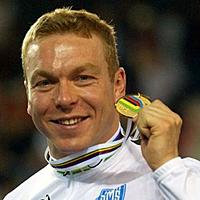
|
Before bidding farewell to the 'kilo', which has been dropped from the Olympic events for track cycling, Chris Hoy made one last ditch effort to break the World kilometre record at altitude in La Paz, Bolivia. Steve Thomas spoke with the 'maestro of the kilo' after he missed the record attempt by a heartbreaking 0.005 seconds to find out about his future plans.
Chris Hoy set out for the last kilo ride of his life in a lonely, empty velodrome in La Paz on May 13, 2007. Absent were the cheering voices he'd grown accustomed to in his years of racing that brought Olympic gold, the sea-level world kilo record, and seven world championships, and he was left in a hollow, solitary battle against hypoxic agony that is the one kilometre time trial.
"It was very strange, it was empty, which I was not used to," Hoy recalled. "If it had been a track meeting you would of heard voices and cheers, and you also know that you are racing against other people, and the conditions are the same for them. This was a real solitary and emotional experience. I'd altered my race plan, and started slower. I had no idea what was happening until a lap after I'd crossed the line, when I saw the score board.
"It would have been easier if I'd been way off the mark."-Hoy on his emotional miss in the kilo altitude record by 0.005 seconds |
"It would have been easier if I'd been way off the mark, but it was 5/1000th of a second off, which was just unbelievable. It would have been emotional either way, a real turning point in my career, but at least I'm glad I gave it a go."
Following that trip to South America, Hoy packed up his gear and headed off to a holiday in the Maldives. A summer holiday is a luxury track cyclists can afford, as it is prime off-season recovery time for a top track sprinter. "It was my first opportunity to take a real holiday in five or six years, a holiday without my bike. I just rested, lay on the beach and recovered," commented Chris Hoy. "I'm just about to start getting back on the bike and back to the gym now, preparing for the new track season."
Unfinished business
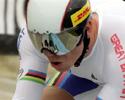
|
The new track season will be very different for the Flying Scotsman in many ways; his first true season of racing in years where the kilo has not been his primary aim, due to the UCI's controversial decision to drop the blue ribbon event from the Olympics, "To be honest I still don't understand it;" Hoy explained, "It took a long time to get used to the idea. It doesn't make sense, but that's the way it is – no use worrying about it, we just have to move on."
With the exclusion of his main event from the Games, Hoy was forced to cut his ties with the race, and he intended to do so in style; with an attempt at the only kilo honour not marked up on his score card, the absolute world record, owned by his great former rival Frenchman Arnaud Tournant. "I knew I was going to have to call it a day at some point, and I really didn't want to be left wondering if I could of beaten the record, and so had to have a crack at it. I would rather fail than not even attempt it."
After winning the keirin and kilo gold medals at the World Championships in Palma, Hoy looked to be on fine form, but things didn't go quite as he'd hoped in La Paz. "I knew that it would be difficult to focus on preparing for the record with my racing schedule, but just had to at least try," Hoy explained, "So we found a window, a small window. We had very limited time to acclimatise, prepare, and make the attempt. I had just 24 hours scheduled between arrival and the first proposed ride.
"I don't want to sound like I'm making excuses, because that's life – but it all started out wrong when the plane had technical problems and we had to make a crash landing at another airport. After we'd taken bus rides and other transfers, we'd lost 15-16 hours of that time, and were really wiped out. My plan had always been to go for the record on the second day of riding, but the weather forecast was not good, and so I decided to go for it straight away, rather than miss all chance of a crack at things."
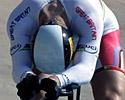
|
Anyone who's ever been to altitude will tell you how tough it is to get acclimatised, which would make Chris's first attempt look like virtual suicide. "It was really hard to even walk up the stairs at the hotel, I was very surprised at the effects," he admitted. Conditions were far from ideal, both in terms of weather and preparation, but after a warm up Chris was in full flight. "Given the altitude I think I went out too fast, it really does take your breath away. It was close, very close. I just collapsed on the floor at the side of the track after the ride, and lay there for almost an hour, it really took it out of me."
The following day came around, and despite the forecast, conditions were slightly better than day one, so Chris went for the second attempt. "I knew, and had already decided, that this would be my last and best chance. At this altitude it really takes it out of you, and I knew three attempts in 48 hours would not be possible."
After that attempt failed by a hair's breadth, Hoy went back to his hotel and had his bags nearly packed and ready to go when he looked out of the hotel window. "It was warming up some, " he described. "I knew I did not have another kilo in me, but thought 'let's at least go for the 500 meters record'. The physiologist was still at the track packing up, so I just went back and went for it." And go for it he did, breaking the record and salvaging something from what had been an epic trip.
Changing gears
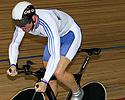
|
It was back in 2001 that Chris had made his first real turn towards the kilo. He'd been a part of the British National Team since he was a junior back in 1996, and had taken a silver medal in the team sprint at the 2000 Sydney Olympics. One of his team-mates for that ride was Jason Queally, who had taken the gold medal in the kilo, and sparked off Chris's interest in the event.
Six years on, and with four World Titles, a Commonwealth and Olympic gold, an Olympic and a world record in the discipline, he has equalled, even maybe surpassed Arnuad Tournant, which gives him right to the title of 'last great king of the kilo'.
Now that the kilo is no longer an Olympic discipline, Chris has set about broadening his horizons by diversifying into other sprint events. This year he had his best ever World Championship - not only did he take gold in the kilo, he also struck gold in keirin and silver in the team sprint, which bodes well for his future. "I set personal bests all the way, even in the team sprint. We lost by about 20mm to the French - they had the best team ever, which I don't think many people appreciated."
The kilo, and indeed to an extent the team sprint, are well controlled and solitary disciplines, unlike the keirin and the sprint, the two disciplines he is now aiming at, giving Hoy different factors to focus on. "In the kilo, and even the team sprint, you know that if you prepare right, are on top form, and things work out,that you will get the result," Hoy explained. "In the keirin and the sprint it's very different, there are far more outside elements to consider. But for me it's exciting, a whole new challenge."
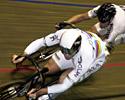
|
Has switching disciplines been a difficult process? "Even though I won the keirin in Palma, I'm still really a novice, and am learning all the time – even more so I the sprint. Physiologically, the keirin is similar to the kilo, 3 laps flat out. It does take more tactical thinking, but I think what I find difficult is that in a kilo or keirin you could be up for maybe 3 rides a day. In a top-level sprint, that can be a dozen. The constant warming up and down and re-focussing is really draining."
Beijing is on the horizon, an obvious goal for any athlete – and what lies beyond that? "The main aim in Beijing is to get a gold – although 2 or 3 would be nice! Realistically the team sprint is my best hope, but maybe the sprint and keirin too - I'm learning all of the time. After that, well, the usual cycle of taking a couple of years to shift direction and deal with other things in life, and then London 2012. I will be 36 then, and as long as I get there that will be my last Olympics."
Also read: Gone in sixty seconds
